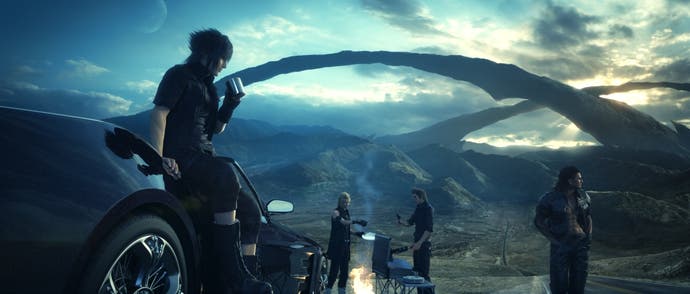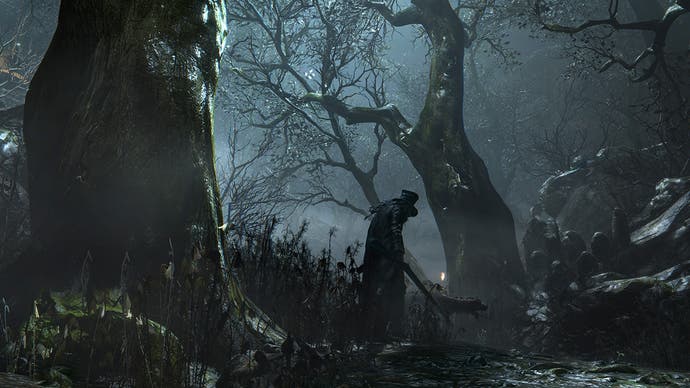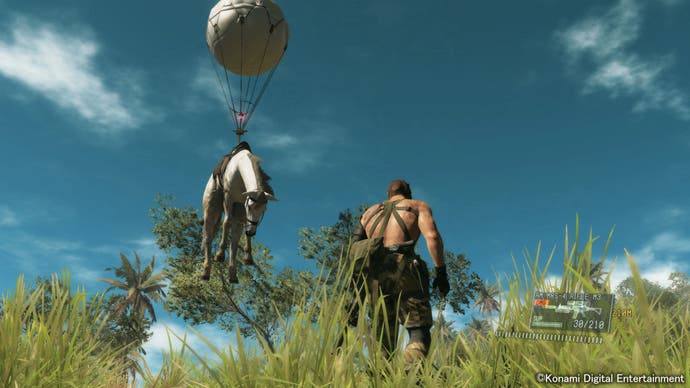Japan's slumbering giants awake at Tokyo Game Show
Metal Gear and Final Fantasy prove there's still plenty to get excited about from gaming's spiritual home.
Stop me if you've think that you've heard this one before. Japan's best years in the games industry are behind it, the Tokyo Game Show is an irrelevance to western audiences and consoles are all but done for in the land that was once their spiritual home. It's bunk, mostly, and this week's show has been a sweet, sharp reminder that Japan remains the source of some of the grandest in the world of video games, as well as the best barometer of its future.
The halls of the Makuharai Messe still tell of a very different scene in Japan - one far removed from the 90s golden age in which the likes of Capcom and Sega were at their brilliant best. Sega's Japanese division retreats further and further from the west, and there's a painful sting as it once again refuses to localise its most high-profile series, Yakuza - while at the same time announcing a Chinese localisation of the next game, Yakuza 0. Capcom, meanwhile, maintains a relatively quiet profile, preparing another Monster Hunter assault while keeping the Resident Evil series gently ticking over as it awaits a grander return.
Nintendo is absent, as ever, even if its presence is felt elsewhere in Tokyo, where the release of Super Smash Bros. on 3DS is one of the biggest of the year - the equivalent, perhaps, to the launch of Destiny in the west. Hoardings promote face-offs between Mario and Rockman, and nearly every StreetPass you pick up on public transport (which is plenty - there's no better place in the world to pick up those last few puzzle pieces than Tokyo's metro) is another player boasting of owning the brawler.

Mobile continues to win out too, taking up well over half of all the games on show. There's a new generation of players in Japan introduced to games entirely through their phones, and a core who embrace mobile in a way that would never be imaginable in the west. They're served by a swell of focused, deep titles from established giants like Dena and Gree as well as the growing ranks of large companies and smaller independents eager to get in on what's fast become the dominant sector in Japanese gaming.
All of which stands to the detriment of the consoles, with the new generation still struggling to gain traction. The launch of the Xbox One a couple of weeks back was miserable, and there's little to suggest it'll do any better than its immediate predecessor, though to Microsoft's credit it keeps plugging away, stealthily releasing Swery's eccentric adventure game D4, picking up and publishing the hyper-niche Raiden 5 and reminding the world that it's acquired the considerable talents of Hideki Kamiya for the platform exclusive Scalebound.
Across the halls, a deepening cultural divide continues to show. Bandai Namco, one of the more successful publishers in Japan, makes its money from series that are increasingly irrelevant to western audiences, and elsewhere there are signs of Japan retreating further into itself. Sometimes that insularity results in reprehensible extremes, as tawdrily proved by the tactless, tasteless Onechanbara stand.

Yet this year's Tokyo Game Show has proved for the first time in an age that Japan's games still have relevance for the traditional AAA audience. The awakening of the slumbering giant that is Final Fantasy 15 leads the charge, a product of a Square Enix that finally looks ready to inject the sense of purpose and excitement that's been so sorely lacking of late back into the series. Naoki Yoshida's dramatic and successful salvaging of Final Fantasy 14 seems to have inspired a new direction at the company as it begins to listen to its many fans once again, and the installation of Hajime Tabata in 15's directors chair could mark an end to the stuffiness of the 13 era - stuffiness that sometimes bordered on arrogance.
There's the creeping influence of western design in Final Fantasy 15, its open world touched by Grand Theft Auto, its combat by Assassin's Creed, but it's hardly an unwelcome one. Metal Gear Solid 5, another star of the show, also displays how there can be a neat infusion of some of the west's biggest franchises with Japan's own. Bloodborne, meanwhile, proves that there's still value in a Japanese game that stands alone, the design philosophy of From Software triple-distilled into something truly potent.

All three are some of the brightest prospects on console in the near future, and what's wonderful is that they're all looking likely for a 2015 release (though that's admittedly with a little optimism in regards to Final Fantasy 15). Japan has been slow in warming to the new generation of consoles, something that's been felt in release schedules in the west as well as in console sales in the east, but after this year's TGS it feels like a turning point may about to be reached.
Japan's developers are eager to pry away the new generation of players attached to their mobiles, and there's a sense that once a critical mass of games arrives on the PlayStation 4 and Xbox One they'll have a better chance of doing so. Whether or not long-established series such as Metal Gear Solid and Final Fantasy are up to the task remains to be seen, but for a western audience with a recently refreshed appetite for blockbuster games, their arrival is thrilling.

